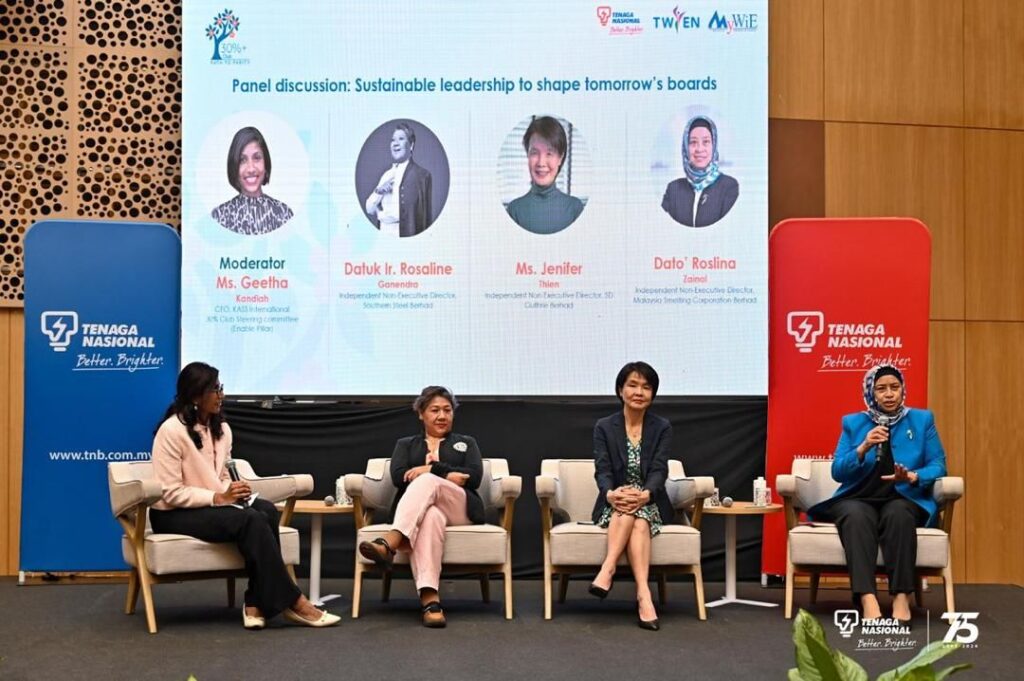
At the Board Awareness Program: Woman in STEM: Power Up! event organised by the 30% Club Malaysia, Tenaga Nasional Berhad and MyWiE. Three women leaders at their respective industries shared their thoughts and journey on board.
The panellists were Datuk Ir. Rosaline Ganendra, Jenifer Thien, and Dato’ Roslina Zainal and the event was moderated by our own Geetha Kandiah.
The panelists agreed that the role of board directors has evolved significantly.
Once upon a time directors were deeply involved in operations, today’s non-executive directors (NEDs) focus more on strategy and act as advisors to CEOs and management teams. Among the key takeaways were:
𝐂𝐨𝐫𝐩𝐨𝐫𝐚𝐭𝐞 𝐆𝐨𝐯𝐞𝐫𝐧𝐚𝐧𝐜𝐞 𝐀𝐜𝐫𝐨𝐬𝐬 𝐁𝐨𝐫𝐝𝐞𝐫𝐬: Serving on multiple boards – locally and internationally – provides invaluable exposure to different governance standards and enhances strategic thinking.
𝐄𝐯𝐨𝐥𝐯𝐢𝐧𝐠 𝐄𝐱𝐩𝐞𝐜𝐭𝐚𝐭𝐢𝐨𝐧𝐬: While directors once handled operational details, today they must focus on strategic decision-making and ensure that management executes effectively.
𝐓𝐡𝐞 𝐑𝐨𝐥𝐞 𝐨𝐟 𝐄𝐒𝐆: As Environmental, Social, and Governance (ESG) becomes mandatory, boards are increasingly seeking technical expertise in sustainability. STEM professionals, engineers, and technocrats are key in addressing these issues.
𝐍𝐚𝐯𝐢𝐠𝐚𝐭𝐢𝐧𝐠 𝐒𝐭𝐞𝐫𝐞𝐨𝐭𝐲𝐩𝐞𝐬: Women on boards often face the stereotype of being too operational or detail-oriented. Embracing self-awareness, trusting others, and adapting to a strategic perspective are essential for overcoming this.
Also, to succeed as a board member, directors must:
1) Understand financial reports and have basic legal knowledge.
2) Have a deep understanding of technical details to inform decision-making.
3) Possess strong personal branding and business acumen, with the ability to translate technical expertise into strategic outcomes.
As emphasised by the panelists, mentoring plays a crucial role in leadership development. When seeking a mentor, it’s vital to ask the right questions, focus on how to present issues, and work collaboratively.
Networking and fostering male allyship also help support women leaders aspiring for board positions.
In conclusion, achieving greater gender diversity in the boardroom requires collective effort. Programmes that prepare women to be board-ready, challenge biases, and value diverse perspectives are critical in building a sustainable pipeline of talent.
Let’s continue to empower future-ready leaders who will drive innovation, inclusivity, and excellence at every level.

